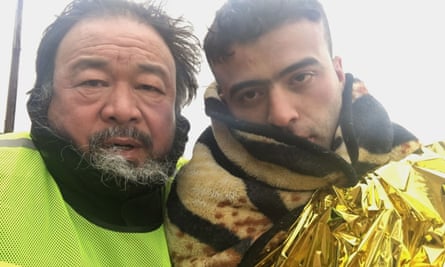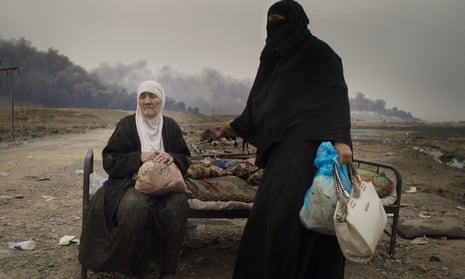The exiled Chinese conceptual artist Ai Weiwei has here created an ambitious, humane and often shocking cine-essay on the subject of migrants and the 21st century migrant condition. With his camera crew, he travels around the world, and finds a globalised story of desolation and desperation. These are people who are frantic enough to jettison everything in their lives and leave – and who by that token have become enigmatic, opaque, difficult to interview. It is not just the language barrier. They have detached themselves from the cultural context in which they have grown up and have not yet been granted admission to that context in which the privileged interviewer or film-maker exists. The connective tissue of conversation has not been cultivated. It puts a greater onus on imagery, on making pictures do the work.
Weiwei’s approach is clearly not to furnish political explanations, still less political solutions – although these are touched on towards the end of the film – but rather to make the leap of empathy, to understand what being a migrant is like in human terms. With its heightened visual sense, and need to trace the contour of a certain type of experience, Human Flow is similar to Gianfranco Rosi’s Fire at Sea, about migrants on the island of Lampedusa. It has points in common with Alejandro González Iñárritu’s immersive VR installation-drama about immigrants, Carne Y Arena. And I have to mention again an excellent and under-recognised film about migrants: Daniel Mulloy’s short Home, a through-the-looking-glass satire starring Jack O’Connell that imagines prosperous Europeans making the journey in the opposite direction. All too often, the media spectacle that we consume makes it look as if migrants’ poverty and perceived inarticulacy is somehow their tribal identity – when of course they were in many cases as prosperous as educated as those people now interpreting their situation and deciding what to do about them.
Ai Weiwei’s film is most potent when it is on the move, following this human flow as people trudge onwards. His camera appears to be mounted high above the stream of refugees, or evidently hovering in a drone. What is particularly striking are the scenes of migrants attempting to cross into Hungary, and heading for Germany. Perhaps it is because we are used to crowd scenes in fiction, and because the TV news does not show migrants en masse and at length, that the sight of this extraordinary crowd is not at first startling. The realisation sinks in after a few seconds. This is a real-life exodus, but one in which the Red Sea, once parted, is now closing up as it sees them approaching.
The most upsetting aspect is the shot of a dead body: perhaps a child or perhaps an adult, lying in the dust, and evidently mangled or decomposed in some way. It is framed and presented in a flat, unemotional way, almost like a statue that has been knocked over; in being shown this, briefly, the audience feels like one of the many people trudging on past it.

Clearly, Human Flow is vulnerable to the charge of fetishising or aestheticising the migrants as spectacle. This was also, at least potentially, an issue with Carne Y Arena. And it is an uncomfortable moment when the director, in an impulsive gesture of sympathy or solidarity, exchanges passports with a refugee, warmly talks about them being the same, and even gets involved in a jokey dialogue about them swapping homes – a tent in exchange for an artist’s studio. Inevitably, and a little embarrassingly, that notion has to be wistfully dismissed as a fantasy and Weiwei must sheepishly get his passport back. It is a graphic demonstration of how his approach cannot work as a one-on-one engagement.
One commentator suggests the three main factors are social media, transportation and globalisation. The first mobilises dissent and indignation more quickly, the second is cheaper than ever, and the third has created greater inequality and greater awareness of inequality. Perhaps the fourth is the existence of the EU, which is now a beacon of hope and aspiration in the way the United States once was. Ai Weiwei doesn’t arrive at answers, but he engages with the subject in fiercely human terms and he compellingly shows that migration is itself a new condition of global market forces, which have disrupted peoples the way world war did a century ago.

Comments (…)
Sign in or create your Guardian account to join the discussion